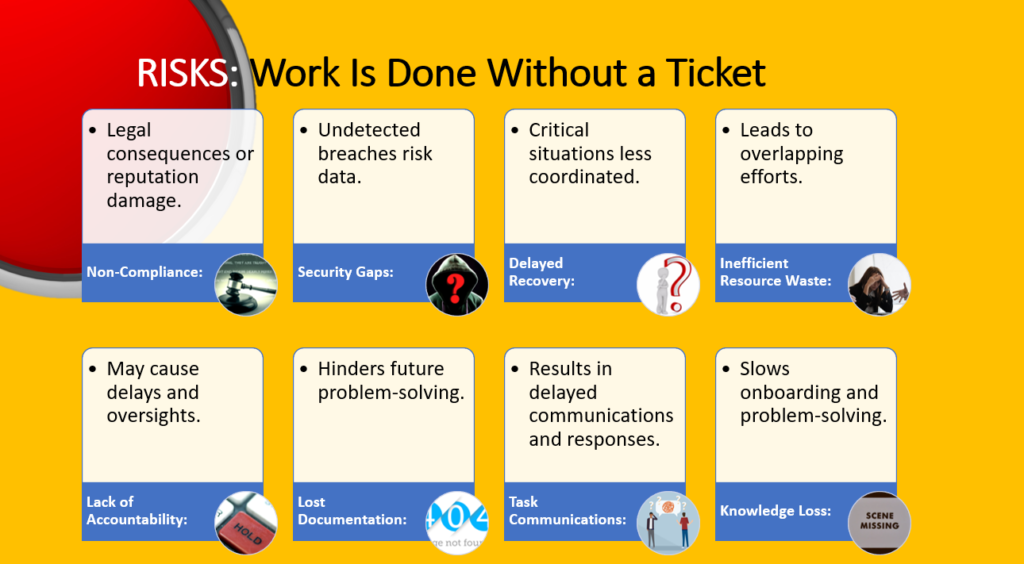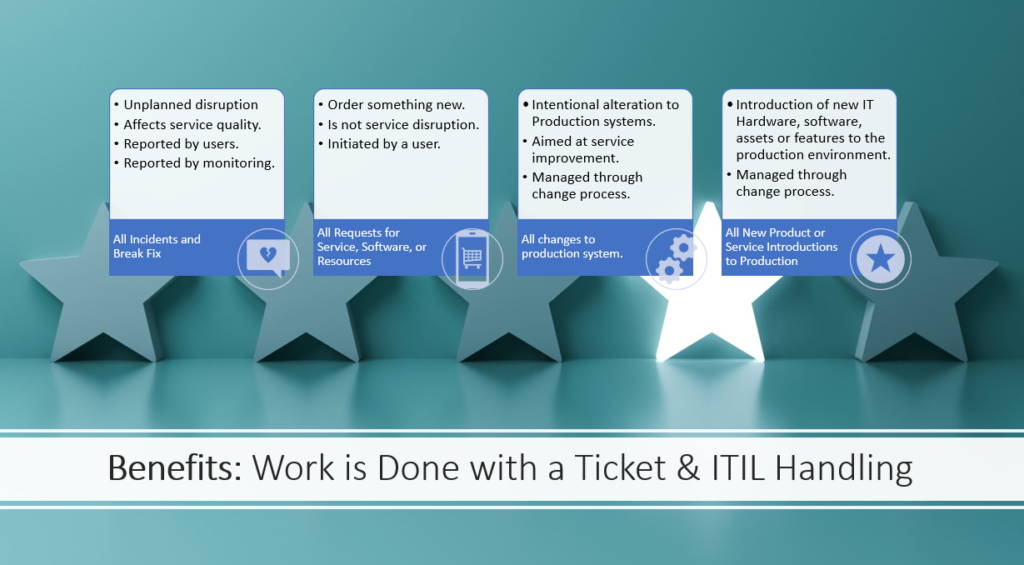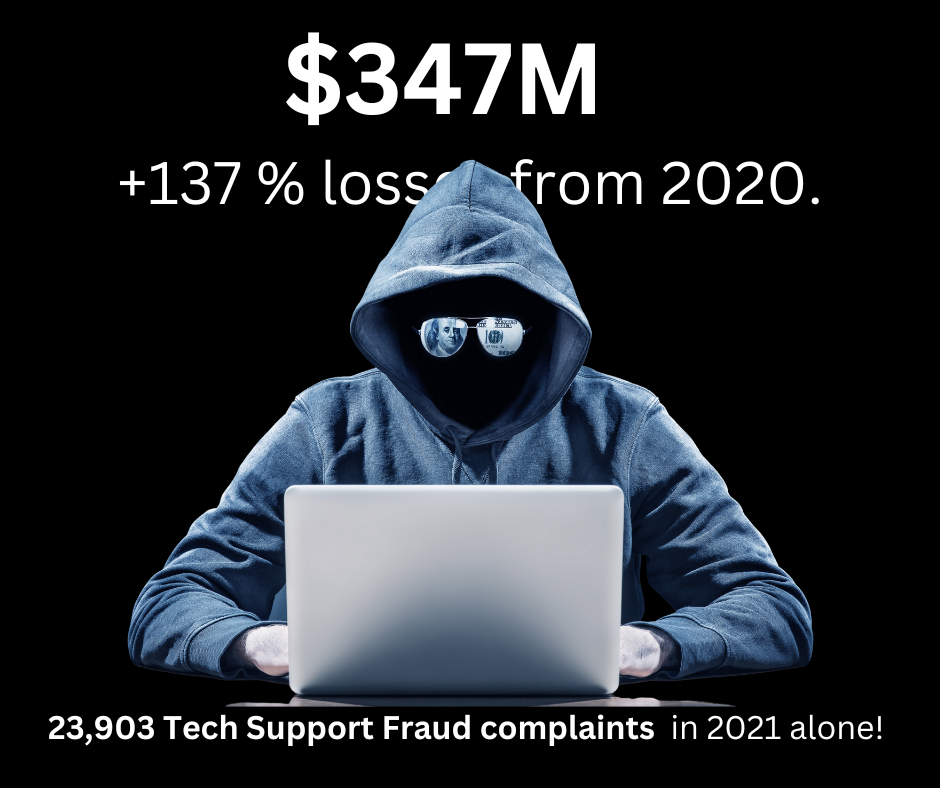Proper Ticket Handling Imperative
Proper Ticket Handling Imperative Overview: In the fast-paced realm of IT, a robust ticketing system is more than just a convenience—it serves as the linchpin for streamlined operations, compliance, and effective incident management. Its importance cannot be emphasized enough, as it aligns with both regulatory standards and the best practices of ITIL Work. Conversely, operating without a ticketing system exposes organizations to avoidable risks, a particularly pressing concern in the current climate of escalating cyber-fraud threats.
“Our organization was focused on fixing problems first, whether we had the ticket or not for something broken was not as important as fixing the incident. Until the day that an undocumented incident resolution to help resolve an incident without a ticket for a frustrated executive with a customer presentation, who was actually a malicious cyber-fraud actor”
~Anonymous

Business Case for Building Resilience: The Imperative of Proper Ticket Handling:
Escalating Cyberfraud Landscape: A +137% Surge
In an era marked by a staggering +137% surge in cyberfraud, the need for reliable and accurate ticket documentation has never been more vital.
Guardians of Operational Integrity and Regulatory Compliance
Properly managed tickets are more than just administrative tools; they serve as the guardians of operational integrity, regulatory compliance, and effective incident response.
Non-Negotiable Practice for Business Continuity and Disaster Recovery
This fundamental practice is non-negotiable for ensuring business continuity, seamless disaster recovery, and adherence to ITIL Work principles.
Ticketing System: The Compass in Treacherous Waters
The stark reality is that conducting work without the anchor of a ticketing system is akin to navigating treacherous waters without a compass—dangerous and likely to lead to unforeseen consequences.
IT Career Questions offers a great video for how to document a ticket properly.
Insufficient Ticketing Practices Impact Regulatory Compliance and Elevate Cyber Fraud Risk
Industries subject to stringent regulations rely on ticketing for precise incident tracking and reporting. Without this system, compliance may be compromised.
Dispersed or Unlogged Ticket Information Hinders Effective Incident Management
In the absence of a structured ticketing system, incident data scatters, making it challenging to retrieve vital information for future reference and audits.
Challenges in Accountability
Clear task attribution becomes elusive without a ticketing system, impeding the ability to evaluate individual and team performance in incident tracking.
Potential for Inefficient Resource Allocation
The absence of tickets may lead to multiple team members independently addressing the same issue, potentially resulting in delays and inefficient resource use.
Clarity in Priority Management
Without tickets to delineate urgency, there may be confusion in identifying and addressing critical issues, potentially causing delays in response.
Knowledge Preservation and Transfer
The absence of ticket records puts valuable institutional knowledge at risk, hampering the onboarding process and hindering the learning process from past incidents.

Remediation Plan: Enhancing Ticket Handling.
Addressing inadequate ticket handling is crucial in fortifying operational efficiency and security. Remediation efforts will vary based on the specific challenges faced. The following plan outlines various strategies to rectify ticket quality and handling issues.
1. Technical Solutions
Implementing patches, updates, and fixes to address vulnerabilities in the IT system. This ensures a more secure and robust ticketing environment.
2. Process Enhancement
Review and adjust workflows to prevent recurring issues and streamline ticket management processes.
3. Training and Education
Provide comprehensive training programs and educational resources to enhance employee understanding and compliance with best ticketing practices.
4. Policy Updates
Review and revise organizational policies, aligning them with industry standards and best practices in IT Service Management.
5. Physical Security Measures
Implement or enhance physical security controls, such as access controls and surveillance systems, to prevent unauthorized access or breaches.
6. Regulatory Compliance Measures
Take steps to ensure the organization complies with relevant laws, regulations, and industry standards in ticket handling.
7. Environmental Cleanup
In cases of environmental issues, initiate cleanup, containment, or treatment of pollutants or contaminants to restore affected areas.
8. Crisis Response Planning
Develop or refine plans and strategies to respond effectively to emergencies or crisis situations related to ticket handling.
9. Recovery and Restoration
Focus on restoring systems, data, or services affected by ticket handling issues, ensuring business continuity and minimizing downtime.
10. Third-Party Engagements
Engage external experts, consultants, or vendors with specialized knowledge or capabilities to assist in the ticket handling remediation process.
11. Ongoing Monitoring
Implement ongoing monitoring and assessment mechanisms to detect and address ticketing issues promptly, ensuring continued operational efficiency.
12. Documentation and Reporting
Maintain comprehensive documentation of all remediation actions taken, providing a clear audit trail for future reference and compliance purposes.
Conclusion
The specific form of remediation chosen will depend on factors such as the nature of the ticket handling issue, industry standards, regulatory requirements, available resources, and organizational goals. Implementing a tailored remediation plan will significantly enhance ticket handling processes and overall operational efficiency.
The specific form of remediation adopted will depend on factors such as the nature of the issue, industry standards, regulatory requirements, available resources, and organizational goals.

What Type of Work Needs Tickets?
ServiceNow Operations Workspace allows you to create, view, and manage all ticket types from an efficient view. ServiceNow recognizes several types of tickets, each designed to address specific aspects of IT service management. These ticket types include:
- Interactions: These tickets are used to capture any form of communication or interaction between IT support and end-users, including Walk Up service, phone calls, emails, chat messages, or in-person conversations. They serve as a record of communication history.
- Incident: Incident tickets are created to report any unplanned interruptions or disruptions in IT services. They represent issues that need immediate attention to restore normal operations.
- Problem: Problem tickets are used to identify and manage the underlying causes of recurring incidents. They focus on finding a long-term solution to prevent future incidents.
- Request Management: This ticket type is used for non-urgent, predefined service requests. It covers a wide range of routine tasks, such as access requests, equipment orders, or software installations.
- Change Management: Change tickets are created to document and manage any proposed changes to IT infrastructure, systems, or processes. They ensure that changes are planned, evaluated, and implemented in a controlled and systematic manner.
By utilizing these different ticket types, ServiceNow provides a structured framework for managing various aspects of IT service delivery, from incident resolution to change management and beyond. This comprehensive approach helps organizations streamline their support processes and maintain a clear record of all interactions and activities.
Resources
- 5-Star ITSM Solutions
- 13 Tips to Boost Your Ticket Queue Management – And Prevent it From Piling up
- Apple: Recognize and avoid phishing messages, phony support calls, and other scams
- FAQs: Governance Risk Compliance
- FBI Warns Of PC And Tech Support Scams; Here’s What To Look Out For | IBTimes
- FTC: How To Spot, Avoid, and Report Tech Support Scams
- Governance Risk and Compliance
- How do you assess and prioritize help desk security risks?
- Knowledge Base of IT and Information Security Reference
- Security and IT Glossary

-
Getting Started
- AI: ServiceNow Virtual-Agent Chatbot
- BMC Remedy ITSM Reference
- Burp Suite Professional & Web Security Process
- COE for Human Resources
- Conduct A Windows-Security Scan
- Employee Journey Management ServiceNow
- Getting Started: Engagement Manager
- Introduction to Knowledge Management
- Knowledge Categorization "Find-ability"
- One-IT: Effective Ticket Handling
- Productivity Tips for Knowledge-Users
- Productivity: Service Operations Workspace
- Quick Start Guide
- Service Catalog Order Guides
- Your Next Steps
-
- Advanced Program Management
- AI: ServiceNow Virtual-Agent Chatbot
- Artificial Intelligence A-Z Glossary
- Business Process Optimization Reviews
- Category Hierarchy and Tabs Layout
- Employee Journey Management ServiceNow
- GE Change Acceleration Process
- GRC Managed Risk
- Overview: Employee Center Pro
- Productivity: Service Operations Workspace
- Proper Ticket Handling Imperative
- Public Sector Digital Services
- RIDAC: Strategic Portfolio Management
- SOX Control-Management and Attestation
-
- Articles coming soon
-
FAQs
- Best of ServiceNow Vancouver
- Chat GPT FAQS
- DevOps & Change Velocity
- Enhancing End-User Service Experience
- FAQs: Governance Risk Compliance
- How-To Import ServiceNow Stories 🚀
- Knowledge Categorization "Find-ability"
- Role of CMDB-Management Service-Owner
- Service Catalog Process FAQs
- ServiceNow IRM SOX FAQs
- Strategic Portfolio Management FAQs
- Ticket Handling Infographic FAQs
- Understanding Clop Ransomware Mitigation
- Vulnerability Response Workspace Module
- Washington ESC or Knowledge Portal?
-
- AI & GRC Defense Against Security-Data Breach
- AI and Improved Knowledgebase-Search
- AI Revolutionizes Service Management
- AutomatePro AutoTest Custom-Testing
- AutomatePro AutoTest: Getting Started
- Best of ServiceNow Vancouver
- CMDB Health Dashboard
- Comparing ServiceNow-Strategic-PM to Microsoft-PM
- Demystifying Taxonomy Categorization
- DevOps & Change Velocity
- Efficient Workday to ServiceNow Integration
- Email-to-Incident is Costly Inefficiency
- Enhancing End-User Service Experience
- Financial Services Operations
- Gamifying ITSM Excellence
- GRC Industry Reference Matrix
- Introducing Security Incident Response
- Role of CMDB-Management Service-Owner
- Service Catalog Process FAQs
- ServiceNow Executive Reporting Approaches
- ServiceNow Virtual Agent Chatbot
- SPM Gantt Chart Presentation
- Strategic Portfolio Management FAQs
- Vulnerability Response Test Plan
- Vulnerability Response Workspace Module
- Washington ESC or Knowledge Portal?
- Show Remaining Articles11 Collapse Articles
-
Glossary Reference
-
Blog
- 2021: VP Harris Inauguration Elevates Diversity and Executive Leadership
- 5-Star ITSM Solutions
- 5-Step Policy-Compliance Risk Management
- AI & GRC Defense Against Security-Data Breach
- AI Revolutionizes Service Management
- AI: Knowledge Centered Support
- ChatGPT Ethics and FTC
- CMDB Corporate Governance for Publicly Held Companies
- Community Crisis Resource Reference List
- Covid Cyber Employment Fraud: $Millions in Job Fraud, $Billions in Unemployment Fraud. Recruiters and Jobseekers Paradigm shift
- Does Post Covid Demand, "Evolve or Fold" Data Strategy?
- Financial Services Operations
- Freshwork's Multichannel vision for FreshService (ITSM)
- Gamifying ITSM Excellence
- GRC Industry Reference Matrix
- Imperative: Governance Risk Compliance
- Jobs n Career Success: Employment News
- Microsoft Teams Tripping Transcription Tenancy.
- Predictive Intelligent Situational Awareness
- Remedy to ServiceNow Migration
- Review and Approve Knowledge
- ROI: Demand AI Service Management
- Top Trends in Project Management
- Uber's Call Center Security Social Engineering Massive System Breach
- Vulnerability Remediation RACI
- Walk Up Experience- Design-To-Deliver
- World Talent Economy Forum on Global Competitiveness
- Show Remaining Articles12 Collapse Articles
-
Healthcare
-
Workday
-
Network Connectivity Solutions
-
Business Process Methodologies

